Touchscreen Not Working on Windows 10 (Fixed)

In the past years, the use of touch-enabled devices has skyrocketed. The convenient nature of a touch screen enables users to get the maximum value out of their devices. However, people who work with touch-enabled Windows 10 computers are experiencing issues with the touch screen not working. In this article, we’ll help you fix them.
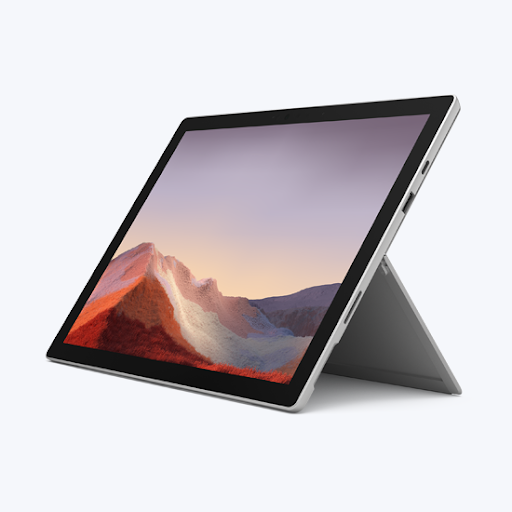
Why touchscreen is not working on Windows 10
There are some reasons why your touch screen might not be responding or stopped working on Windows 10, such as:
- Driver issues
- System settings
- Hardware issues
- Malware infection
- Registry errors
Recommended: Microsoft Office 2019 vs. Office 365 – What’s Your Choice?
How to fix Touchscreen not working on Windows 10
Continue reading to find out how to fix the touch screen not working on Windows 10.
Method 1. Run the Hardware and Devices troubleshooter
An easy fix can be applied by simply running one of Windows 10’s many integrated troubleshooters. This tool aims to quickly identify and fix issues with your touchscreen, making the process faster and more cost-efficient.
- Open the Settings application using the Windows + I keyboard shortcut or the gear icon from your Start menu.
- Click on the Update & Security tab.
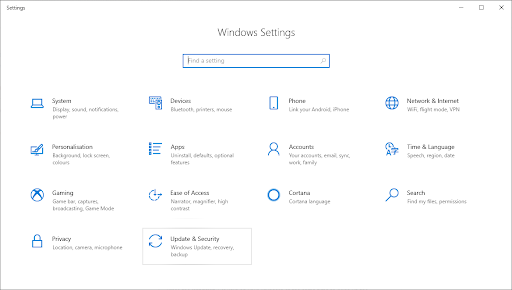
- Scroll down and choose Troubleshoot from the menu on the left-side pane.
- Look for the Hardware and Devices troubleshooter, then select it with your mouse and choose to Run the troubleshooter.
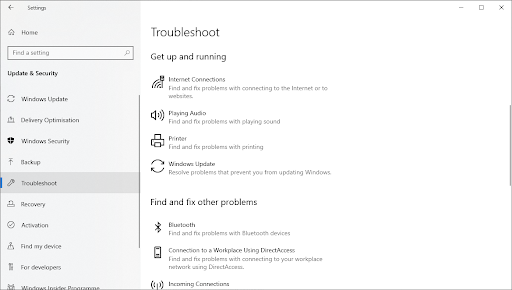
- Follow all of the on-screen instructions to identify any issues with your touchscreen. Select the appropriate action to fix or get more information about the error if anything is picked up.
Method 2. Disable and re-enable the Human Interface Device (HID) driver
Restarting the driver associated with your touchscreen could quickly solve issues related to it.
- Press the Windows + R keys on your keyboard at the same time to bring up the Run utility.
- Type in “devmgmt.msc” without quotations, then hit the OK button. This is going to launch the Device Manager in a separate window.
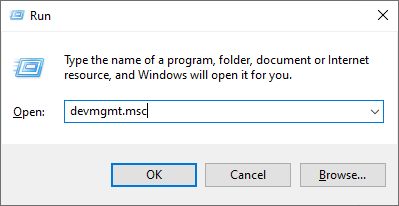
- Expand the Human Interface Devices category.
- Right-click on the HID-compliant touch screen listing, then select Disable from the context menu.
- Wait for a minute, then right-click on the HID-compliant touch screen listing again and select Enable from the context menu.
- Test if the touchscreen is working correctly after the reboot.
Method 3. Reinstall the touchscreen driver
If restarting the driver didn’t do the trick, you should move on to try reinstalling it instead. The steps below show the tested and accurate method of uninstalling the touchscreen drivers, then reinstalling them with only a few clicks.
- Press the Windows + R keys on your keyboard at the same time to bring up the Run utility.
- Type in “devmgmt.msc” without quotations, then hit the OK button. This is going to launch the Device Manager in a separate window.
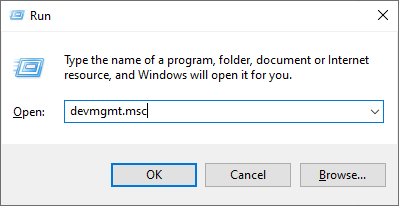
- Expand the Human Interface Devices category.
- Right-click on Intel(R) Precise Touch Device and choose Uninstall from the context menu. Follow any on-screen instructions to remove the device.
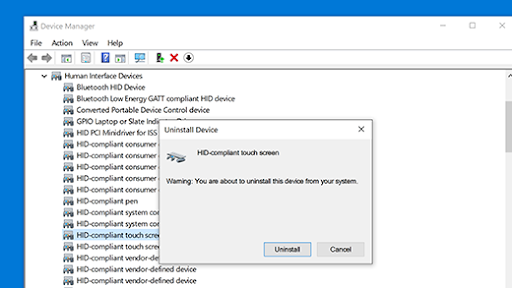
- Repeat the uninstallation for any HID-compliant touch screen listings you see.
- When the uninstallations are complete, navigate to Action → Scan for hardware changes. It’ll automatically reinstall the drivers correctly, which may help you get rid of the issues you’ve been experiencing.
Method 4. Reset touch calibration to the default settings
Touch-enabled Windows 10 devices come from the factory already calibrated and optimized for the best performance. If you or someone else manually calibrates your device’s touch settings, reset them to default, as this can result in issues with your touchscreen.
- Use the search option in your taskbar, and look for “calibrate.” Select Calibrate the screen for pen or touch input from the list of results.
- Select Reset from the options.
- If the Reset option is unavailable and seems to be greyed out, your device is already on the default factory settings. Please try a different solution.
- Select Yes, then follow the onscreen instructions to reset the calibration of your device to default.
- Restart your device and check if the touchscreen issue has been resolved.
Method 5. Change the power management settings
Your Power Management settings may disable your touchscreen from time to time, causing it to disconnect and stop working temporarily. You can quickly fix this by making one minor adjustment in the Device Manager. Follow the guide below for further instructions.
- Press the Windows + R keys on your keyboard at the same time to bring up the Run utility.
- Type in “devmgmt.msc” without quotations, then hit the OK button. This is going to launch the Device Manager in a separate window.
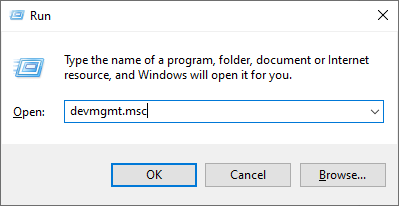
- Expand the Human Interface Devices menu by clicking on the arrow next to it.
- Double-click on the HID-compliant touch screen listing.
- In the new window, switch to the Power Management tab.
- Uncheck the box next to Allow the computer to turn off this device to save power, then click OK.
- Restart your device and see if you still experience issues with the touchscreen.
Method 6. Update Windows 10 to the latest version
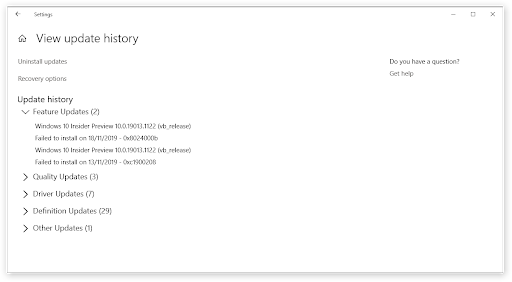
If none of the methods above seem to work, the last thing you can try is simply upgrading to the newest Windows 10 release. This can fix bugs, bring new features, patch security holes, and much more.
Here’s how you can update Windows 10.
- Click on the Start menu and choose Settings. Alternatively, use the Windows + I keyboard shortcut for quicker access.
- Click on the Update & Security tile.
- Make sure to stay on the default Windows Update tab.
- Click on the Check for updates button.
- Click on the Install button and wait for Windows 10 to download and apply if an update is found.
After the update has successfully been installed, make sure to check the performance of your touchscreen. If it still doesn’t seem to work, you might need to contact Microsoft and seek a professional to restore your device.
Read: How to Fix High CPU usage on Windows 10
Final thoughts
If you need further help, don’t be afraid to reach out to our customer service team, which is available 24/7. Please return to us for more informative articles on productivity and modern-day technology!
Would you like to receive promotions, deals, and discounts to get our products for the best price? Don’t forget to subscribe to our newsletter by entering your email address below! Receive the latest technology news in your inbox and be the first to read our tips to become more productive.
You may also like
> How to Fix High CPU Usage By Antimalware Service Executable (MsMpEng)
> How to Disable Skype on Windows 10 (5 Methods)
> How to Fix Discord Not Opening (6 Working Methods)











